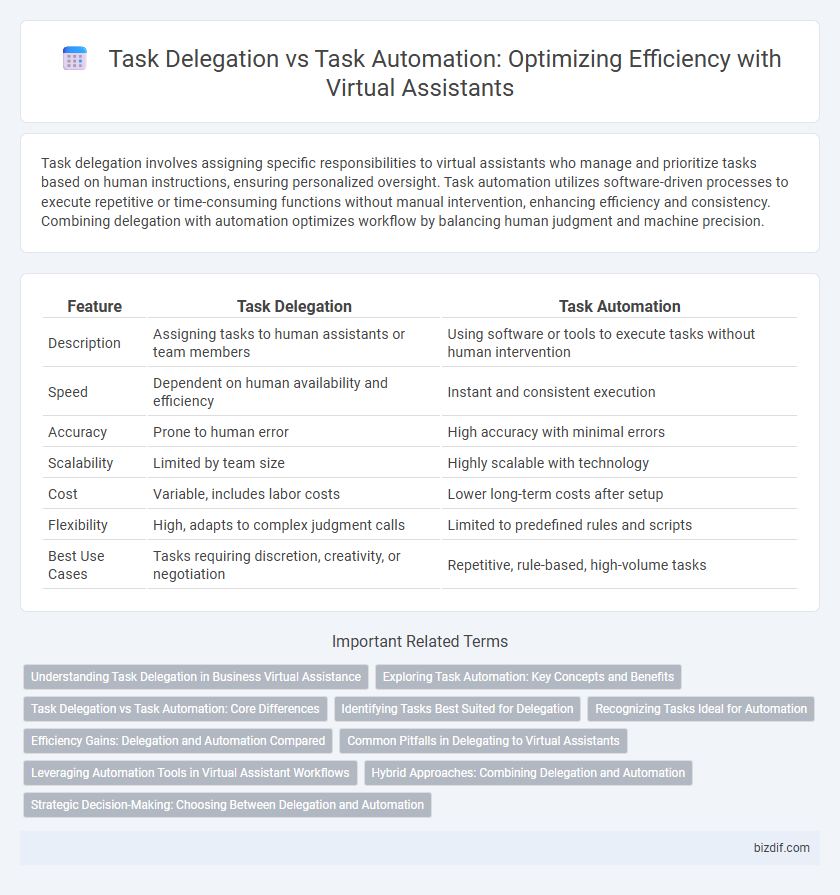Task delegation involves assigning specific responsibilities to virtual assistants who manage and prioritize tasks based on human instructions, ensuring personalized oversight. Task automation utilizes software-driven processes to execute repetitive or time-consuming functions without manual intervention, enhancing efficiency and consistency. Combining delegation with automation optimizes workflow by balancing human judgment and machine precision.
Table of Comparison
| Feature | Task Delegation | Task Automation |
|---|---|---|
| Description | Assigning tasks to human assistants or team members | Using software or tools to execute tasks without human intervention |
| Speed | Dependent on human availability and efficiency | Instant and consistent execution |
| Accuracy | Prone to human error | High accuracy with minimal errors |
| Scalability | Limited by team size | Highly scalable with technology |
| Cost | Variable, includes labor costs | Lower long-term costs after setup |
| Flexibility | High, adapts to complex judgment calls | Limited to predefined rules and scripts |
| Best Use Cases | Tasks requiring discretion, creativity, or negotiation | Repetitive, rule-based, high-volume tasks |
Understanding Task Delegation in Business Virtual Assistance
Task delegation in business virtual assistance involves assigning specific responsibilities to skilled virtual assistants, ensuring efficient workload management and enhanced productivity. Unlike task automation, which uses software or tools to perform repetitive jobs, task delegation leverages human expertise for complex decision-making and personalized client interactions. Effective delegation optimizes operational workflows and fosters collaboration between business owners and virtual assistants.
Exploring Task Automation: Key Concepts and Benefits
Task automation uses software or AI tools to perform repetitive tasks without human intervention, increasing efficiency and accuracy in workflows. Key concepts include scripting, machine learning, and robotic process automation, which streamline processes such as email management, data entry, and scheduling. The benefits of task automation include reduced operational costs, minimized errors, and free-up time for employees to focus on strategic activities.
Task Delegation vs Task Automation: Core Differences
Task delegation involves assigning specific responsibilities to virtual assistants who use judgment and adaptability to complete tasks, whereas task automation relies on software or algorithms to perform repetitive activities without human intervention. Delegation enables customized support and flexibility, ideal for complex or nuanced assignments, while automation excels at increasing efficiency and consistency in routine processes. Understanding these core differences helps businesses optimize workflow by balancing human insight with technological precision.
Identifying Tasks Best Suited for Delegation
Tasks requiring complex decision-making, nuanced understanding, and interpersonal skills are best suited for delegation to a virtual assistant, ensuring effective human judgment and personal touch. Routine, repetitive tasks like data entry, scheduling, and basic communication are ideal candidates for automation, freeing up time for strategic activities. Identifying tasks that blend strategic importance with the need for adaptive responses ensures optimal division between delegation and automation, enhancing productivity and operational efficiency.
Recognizing Tasks Ideal for Automation
Tasks ideal for automation typically involve repetitive, rule-based processes with high volume and low complexity, such as data entry, appointment scheduling, and email filtering. Virtual assistants excel at distinguishing between tasks that require human judgment and those that can be streamlined through software bots, reducing errors and freeing up time for strategic activities. Leveraging machine learning algorithms enhances task recognition accuracy, ensuring optimal delegation between human assistance and automation systems.
Efficiency Gains: Delegation and Automation Compared
Task delegation in virtual assistants enhances efficiency by distributing complex or decision-based responsibilities to human agents who provide personalized judgment and context understanding. Task automation accelerates routine, repetitive processes through AI-driven software, reducing human error and operational costs. Combining both strategies maximizes efficiency gains by leveraging human expertise for nuanced tasks and automation for scalable, high-volume workflows.
Common Pitfalls in Delegating to Virtual Assistants
Common pitfalls in delegating tasks to virtual assistants include unclear instructions, which lead to misunderstandings and inefficiency, and overloading assistants with tasks beyond their expertise or scope. Lack of proper training and failure to set measurable expectations contribute to decreased productivity and errors. Consistent communication gaps and inadequate feedback loops further hinder successful task delegation in virtual assistant management.
Leveraging Automation Tools in Virtual Assistant Workflows
Leveraging automation tools in virtual assistant workflows enhances efficiency by automating repetitive tasks such as scheduling, email management, and data entry, allowing virtual assistants to focus on higher-priority responsibilities. Task delegation involves assigning specific duties to team members or external contractors, while task automation utilizes software like Zapier, Microsoft Power Automate, or AI-driven solutions to execute processes without human intervention. Integrating automation tools with delegation strategies optimizes task management, reduces errors, and accelerates project completion within virtual assistant operations.
Hybrid Approaches: Combining Delegation and Automation
Hybrid approaches in virtual assistants leverage both task delegation and task automation to maximize efficiency and accuracy. By delegating complex, judgment-based tasks to human agents while automating repetitive, rule-based processes, these systems optimize resource allocation and enhance user experience. Integrating artificial intelligence algorithms with human oversight ensures adaptive task management, reducing errors and improving response times.
Strategic Decision-Making: Choosing Between Delegation and Automation
Strategic decision-making in virtual assistant management involves evaluating whether to delegate tasks to human assistants or automate them through AI-driven solutions. Task delegation leverages human judgment and adaptability for complex, nuanced activities, whereas task automation optimizes efficiency and consistency for repetitive, rule-based processes. Balancing these approaches enhances productivity by aligning resource allocation with the specific demands of each task.
Task delegation vs Task automation Infographic

 bizdif.com
bizdif.com